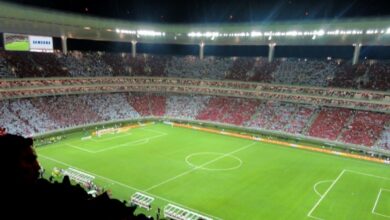Women’s football in Latin America: myth or reality?
The continent has more established championships for women in Brazil, Chile, and Colombia. But in Argentina, they still are working on making it possible

Women's football has been a reality for some years now, in the United States, Europe and in some Latin American countries. But, professionalization is another level and it is now when a country with as much soccer tradition as Argentina, will climb a step to turn their women's tournament IGNORE INTO a professional one.
Leer en español: Fútbol femenino en Latinoamérica: ¿Mito o realidad?
Clarín, in an extensive research work on the subject, remembers that playing ball was, until recently, only a matter of men and that it was prohibited for women in Brazil for almost forty years (1941-1979) because women had to protect their bodies, which were reserved for motherhood.
Europe is, along with the United States, a pioneer in the rise of women's leagues with tournaments established in Spain, England, Italy, Germany, France, Portugal, Russia, Ukraine, Belgium, Turkey, Holland and Austria , all under the concept of five teams, and with important subsidiaries of teams such as Atlético de Madrid, Arsenal, Milan, Sporting Club Lisboa and PSV Eindhoven, according to information published on Uefa.com. In turn, since 2001 the Women's Champions League has been played in which the current champion is Olympique de Lyon of France, according to El Espectador.
In South America, Argentina seems to be the next to become professional in the discipline of women . This league, is divided for the feminine modality in first division (14 teams) and second (18) but they still lack the juvenile divisions and the adequate infrastructure. In that sense, El País assures that a resolution of Conmebol that will rule from 2019 will force the clubs that play international tournaments to have a female team.
You may be interested in reading: The financing of women's football is still in its infancy
Colombia reality, Argentina is heading
2018, 27 years later, and thanks to the active feminist struggle in Argentina, football is heading towards an important achievement: the professionalization of the activity in the country, as far as women are concerned. In that sense, Ricardo Pinela, president of the Women's Football Commission of the Argentine Football Association (AFA), assures El Clarín that "in four or five years, professionalization will not only reach Argentina but the rest of the region".
The leader recalled in the same interview that Colombia took a step forward when it launched its Professional League in 2017, consolidating an idea that had been born in March 2016. The first final between Independiente de Santa Fe and Atlético Huila was held in El Campín stadium in Bogotá and had 33 thousand 327 spectators.
It must start with equality
Pinela clarified that the work for professionalization should go in conjunction with the AFA: "90% of the delegates of Women's Football are not members of the governing committees of their clubs, but we promote them through the National Women's Team, with which delegates travel and thus initiate the managerial transformation ".
In this sense, LatinAmerican Post recently published an article that referred, among other examples, to Lucia Barbuto, president of the Banfield club, whom they trust to accelerate the professionalization of football in that country and, above all, to open up women in diligent positions and not only of press and communications.
Sofia Florentin is a player who recently signed with UAI Urquiza because she offered better conditions than those she had in River Plate, according to El Clarín. "At River, I had already completed a cycle, and I went in search of a new objective, so I decided to go to the UAI, and at River I received a per diem, which is something that is already happening in several clubs, which makes it a bit more professional," he explained.
"Many times my salary does not reach me by the end of the month and I have to ask my parents for help just to continue maintaining that illusion that one day women's soccer, here in Argentina, can become a little better," she told her Once in El País, Adriana Sachs, defender of 24 years of the UAI Urquiza team, with whom she works as a cleaning employee.
Luana Muñoz, of the Tyler Junior College of the United States, offered a very cautious vision about the professionalization of El Clarín. "We are optimistic: women's football has to professionalize as quickly as possible, but five years is something very close to making the sport really professional," he said.
Constant conflicts
In 2017, the players of the Argentine national team caused conflicts with the Argentine Football Association (AFA), due to the travel expenses, which were also their only income. Prior to that conflict and two friendlies against Uruguay, women's football in Argentina had stopped for 25 months due to an institutional crisis that arose after the Pan American Games in Toronto 2015, according to El País.
The same newspaper adds that Argentine internationals do not receive awards or salary. They only receive a daily allowance of 150 pesos ($ 8.50) for training and $ 25 for trips. The practices are in the property that the AFA to one hour of Buenos Aires, which implies to travel long distances in public transport.
"In Spain, the conditions are much better," says Yael Oviedo, 25, of the Granada team. "There is a top league where the players win very well and the team plays friendly matches in first level countries. I do not pay for transportation because I use mobile phones from the club. Argentina is far below the rest and being such a football fan is regrettable," he added to El País.
LatinAmerican Post | Onofre Zambrano
Translated from: 'Fútbol femenino en Latinoamérica: ¿Utopía o realidad?'
Listen this article





